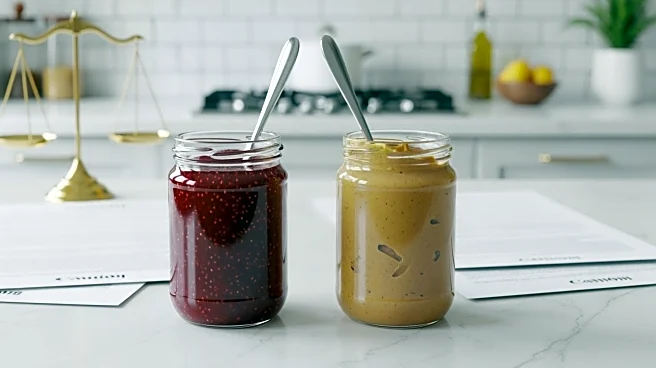What's Happening?
JM Smucker has initiated legal action against Trader Joe's, alleging that the retailer is selling sandwiches that closely resemble its Uncrustables brand. The lawsuit, filed in Ohio, accuses Trader Joe's of
launching a product called Crustless Peanut Butter & Strawberry Jam sandwiches, which Smucker claims is an 'obvious copycat' of its own offering. The legal complaint highlights issues of trademark infringement, trademark dilution, unfair competition, false designation of origin, and deceptive trade practices. Smucker is seeking damages, costs, profits, and injunctive relief under Ohio law. The company has seen consistent growth in sales of its Uncrustables brand, with a reported $920 million in net sales for the 12 months ending in April, marking the 11th consecutive fiscal year of double-digit sales growth.
Why It's Important?
The lawsuit underscores the importance of intellectual property rights in the food industry, where brand recognition and product differentiation are crucial for maintaining market share. JM Smucker's legal action against Trader Joe's could set a precedent for how similar cases are handled, potentially impacting how retailers develop and market their private-label products. The outcome of this case could influence the strategies of other food manufacturers and retailers, as they navigate the complexities of trademark laws and competitive practices. For Smucker, protecting its Uncrustables brand is vital to sustaining its growth trajectory and defending its market position against competitors.
What's Next?
The legal proceedings will likely involve detailed examinations of the similarities between the two products and the potential impact on consumer perception. Trader Joe's response to the lawsuit could include adjustments to its product offerings or a legal defense challenging Smucker's claims. The case may attract attention from other industry players, who could weigh in on the implications for trademark enforcement and competitive practices. Depending on the court's decision, there could be broader ramifications for how food brands protect their intellectual property and how retailers approach product development.
Beyond the Headlines
This case highlights the broader issue of intellectual property rights in the consumer goods sector, where companies must balance innovation with legal compliance. The outcome could influence how brands approach product differentiation and the extent to which they can protect their market innovations. Additionally, the case may prompt discussions on the ethical considerations of product imitation and the responsibilities of retailers in ensuring fair competition.









